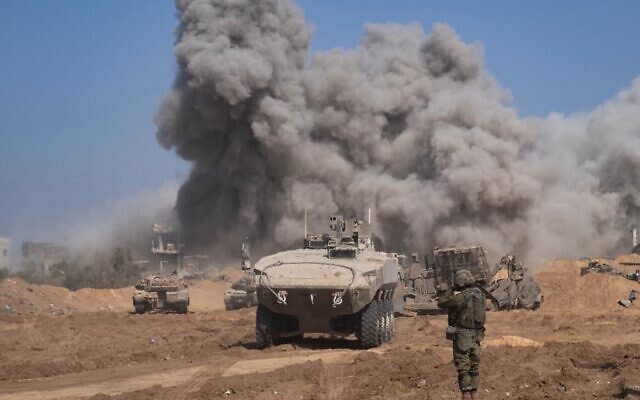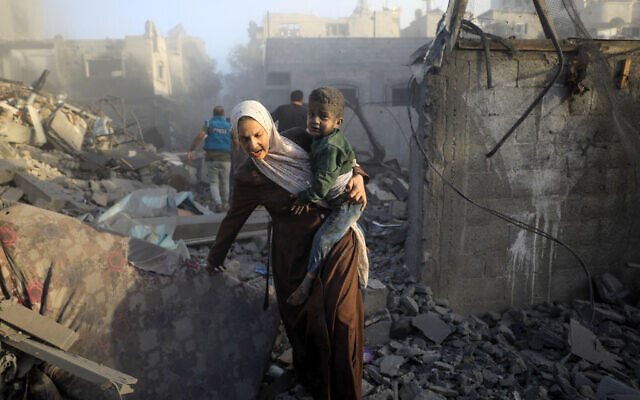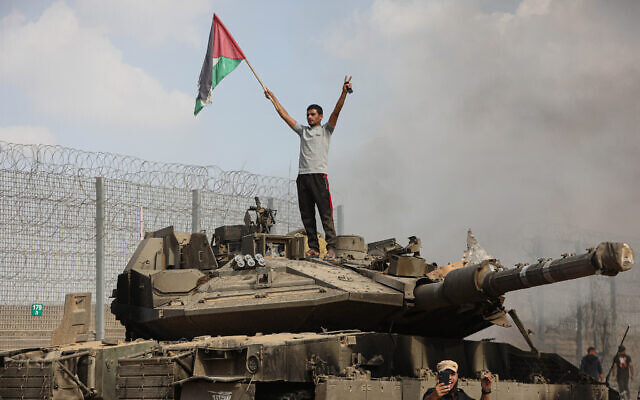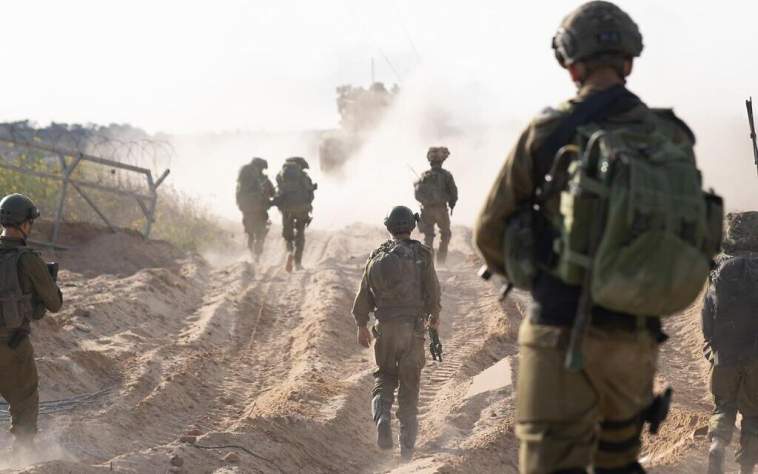(Times Of Israel) After a period of doubt as IDF troops idled on the Gaza border for weeks, Israel’s government has shown a serious commitment to the ground invasion of the Hamas-run enclave.
Three divisions are inside the northern half of the Gaza Strip, cutting the territory in half and making steady progress toward the heart of Gaza City.
A month into the war, launched in the wake of the Hamas massacres on October 7, the military and Israel’s political leadership boast of significant achievements against Hamas. Israel’s allies continue to support its attempts to destroy the terrorist organization, and the unity government running the war appears stable.
But there are reasons for concern, even if the war seems to have gone even better than expected at this point.
‘Very wisely, very carefully’
After October 7, experts warned that the impending ground invasion would be “very, very messy.” The US sent military experts to Israel to reportedly convince its leaders that urban combat would be too bloody, and that a more prudent path would be an operation consisting of airstrikes and special forces raids.
Israel instead went a different route, dispatching tanks, infantry, and combat engineers in deliberate maneuvers across the territory’s dunes and fields along the border before reaching Gaza City’s suburbs. Thousands of reservists joined much of the military’s active ground force inside the Strip.

A handout photo shows IDF soldiers operating in the Gaza Strip, in pictures distributed on November 4, 2023. (Israel Defense Forces)
Ten days in, some observers are breathing a cautious sigh of relief.
“I’m surprised by how well the ground invasion seems to be going,” said Michael Oren, a former Israeli ambassador to the United States. “It seems to be going smoothly, progressing slowly. There has been no major mishap so far.”
“I think it’s going slightly better than I expected in terms of the rate of advance, the ratio of casualties,” concurred Eran Lerman, vice president of the Jerusalem Institute for Strategy and Security and past deputy director of Israel’s National Security Council.
“Given the extremely complex conditions, they’re doing it very wisely, very carefully.”

Lt. Ariel Reich, Sgt. Adi Danan, Staff Sgt. Halel Solomon, Staff Sgt. Erez Mishlovsky, Cpl. Lior Siminovich, and Staff Sgt. Roei Dawi, who were killed in Gaza on October 31, 2023.
Thirty-two IDF soldiers have died since the ground invasion began. Though every one of those deaths is felt deeply within an already grieving Israeli society, that figure is far lower than anticipated.
In 2014, the army told the government that retaking the Strip would cost hundreds of soldiers’ lives, and the Israel Defense Forces would face numerous abductions by Hamas. It would also take some five years, the military said.
A retired IDF general said that just taking Gaza City would cost the lives of up to 700 soldiers.
But in a week and a half of urban combat against an enemy that had more than 15 years to prepare its defenses, Israel has lost fewer soldiers than it did in the final act of the 2006 Second Lebanon War.

People flee following Israeli airstrikes on a neighborhood in the al-Maghazi refugee camp in the central Gaza Strip amid battles between Israel and the Palestinian terror group Hamas, on November 6, 2023. (Yasser QUDIH / AFP)
Even more importantly, the IDF seemingly has so far done what it wants, when it wants. Hamas can shoot off RPGs before rushing back into tunnels, but it has not shown itself capable of doing anything that would keep the IDF from reaching exactly where it wants to go.
IDF soldiers are able to calmly record videos of themselves dedicating the destruction of Hamas tunnels to slain relatives.
There are even reports of IDF assessments that Hamas’s will to fight is plummeting under relentless Israeli pressure.

A Palestinian stands on a burning tank in the city of Khan Younis in the southern Gaza Strip after some 3,000 Hamas terrorists destroyed the border fence and entered Israel. October 7, 2023. (Yousef Mohammed/Flash90)
Such assessments could be hyperbole, but there have been no Hamas surprises since Israel moved in. The terror group appears to have been set back on its heels, struggling to react as the IDF retains the initiative.
At this stage in the war and in the ground phase, the tactical and operational situation seem as good as Israel could have expected.
One important caveat: Israel’s leaders have insisted that the ground operation will hasten the release of the 240 hostages. In fact, only 1 soldier has been extricated, and Hamas is not showing signs of feeling pressured to release them.
Crucially, furthermore, even as Israeli forces move in on Hamas’s headquarters in Gaza City, a pressing question looms over the entire war — how much time does Israel have?
Tick-tock
When Israel goes to war, a diplomatic clock starts ticking. The IDF has to reach its objectives before international pressure becomes so great that it has to agree to a ceasefire.






